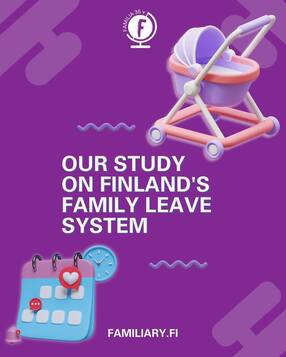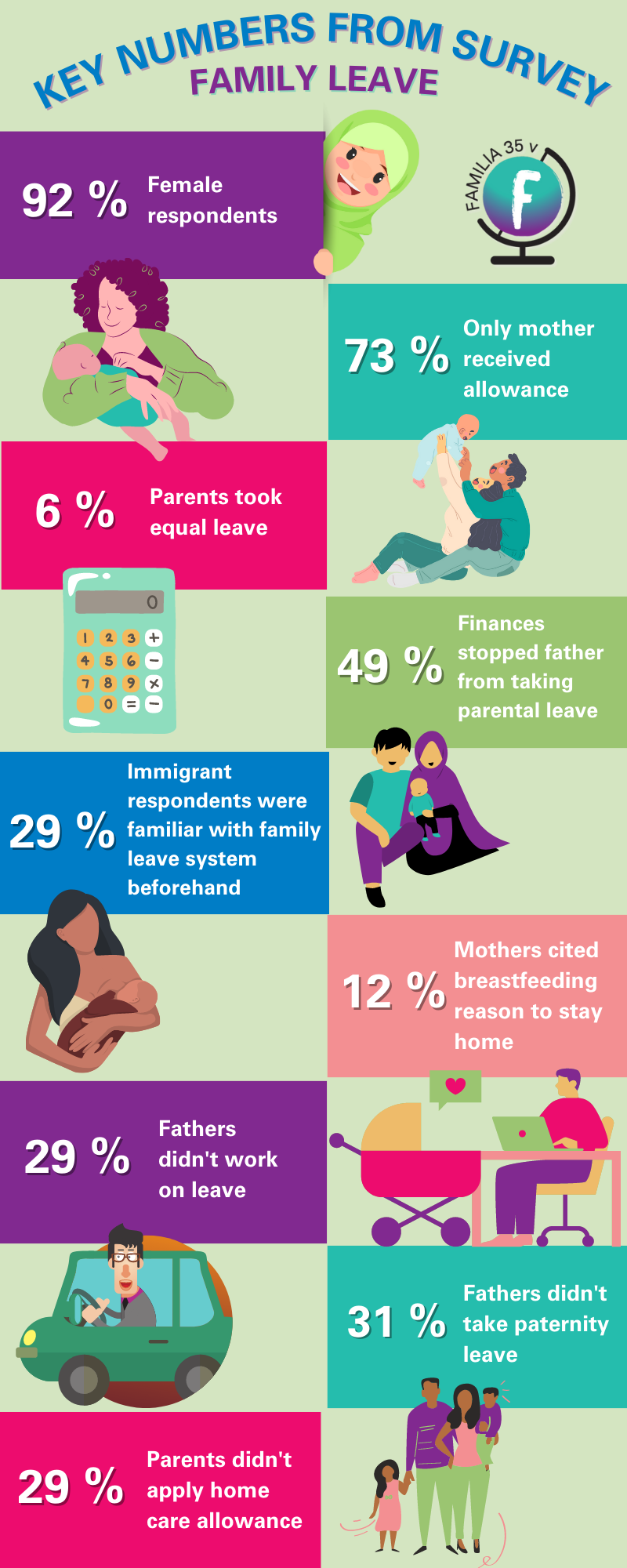Family leave survey
|
The Finnish family leave system is often considered one of the most extensive in the world. As the leading advocate of intercultural families in Finland, Familia is doing ongoing research on their experiences on living in the country.
The survey was conducted through our social media channels in summer 2022, June to July. It must be noted this was done right before the reform of parental leave system, in the autumn of 2022. Through the survey, Familia tried primarily to find out the types and length of family leave taken by intercultural families, their division of the leave between the partners, and their reasoning for these. Additionally, the understanding of the Finnish family leave system by intercultural parents was also explored, as well as the parents' suggestions for improving the system. |
What did we ask?
Familia’s survey regarding the use of family leaves by intercultural families in Finland was comprised of three different sections. In the initial section, the respondents were asked for their demographic details, such as their gender, age, marital status, and education. Additionally, they were asked for the form of their family and some definitive details about it. Finally, the respondents were also asked for a few details about the other parents in the family, such as the partner's country of birth, and their education.
In the second section of the survey, respondents were asked about the usage of the different types of family leave in their family. The respondents were first asked about their usage of specifically the parental allowance. Consequently, respondents were asked about the usage in their family of the paternity allowance. Finally, the end of the section included questions about the family’s possible usage of the home care allowance.
Finally, towards the end of the survey questionnaire respondents were asked about their level of knowledge about the Finnish family support system, the sources for their knowledge, and their suggestions for improving the system.
In the second section of the survey, respondents were asked about the usage of the different types of family leave in their family. The respondents were first asked about their usage of specifically the parental allowance. Consequently, respondents were asked about the usage in their family of the paternity allowance. Finally, the end of the section included questions about the family’s possible usage of the home care allowance.
Finally, towards the end of the survey questionnaire respondents were asked about their level of knowledge about the Finnish family support system, the sources for their knowledge, and their suggestions for improving the system.
Who was participating?
|
This survey was aimed at parents in multicultural families, but was open to all. 94 % of the respondents were parents in intercultural families, most likely through to our social media following base being largely intercultural people. In 83 % of the respondent families one of the parents were born in Finland. In 75 % of our respondent families the father was foreigner-born. Of all families 72 % were in a form of a nuclear family, most having 1 to 2 children. Most of them were also married or cohabitating. 56 % of our survey respondents were Finnish women with a male partner born in another country. 85 % of the respondents were aged 30 or above.
Looking at the average respondent to the survey, this one is typically a Finnish female in her thirties, rather highly educated, who is heterosexually married and has one or two children. In contrast, her partner is most often a foreign male, with slightly lesser education, but still higher than the Finnish average. These features of the respondents and their partners are interesting and important to bear in mind when reading the results of the survey, because these do not necessarily represent the average or most common intercultural family in Finland. |
What did we find out?
|
Here’s some interesting key numbers we found out.
|
Conclusions and policy recommendations
Based on the survey results, and particularly the respondents’ suggestions, this report makes several policy recommendations.
As suggested by the survey results and respondents’ suggestions, such measures will considerably facilitate their usage of the family leave, thus allowing members of intercultural families to equally exercise their basic right to care for their newborn.
- The minimum daily rate of the family allowances shall be raised to a sustainable rate to allow all parents in Finland to take care of their newborn, regardless of their personal or occupational situation.
- The integration of foreign-born parents into the labor market in Finland must be significantly improved, to equalize their possibility to utilize the salary-tied types of family leave.
- The sum of home care allowance should be increased, or the salary-tied types of family leave shall be prolonged.
- More flexibility shall be allowed in the distribution of the allowances between the parents, in receiving the allowances only part-time.
- Better and more information about the allowance shall be distributed.
As suggested by the survey results and respondents’ suggestions, such measures will considerably facilitate their usage of the family leave, thus allowing members of intercultural families to equally exercise their basic right to care for their newborn.
To be noted!
On the 1st of August 2022 a reform in the family leave in Finland entered into force. Among the significant changes offered by the reform, it has given for the first time an equal quota of parental leave to both parents. Additionally, the overall length of family leave has been extended and more flexibility in using the leaves was offered. According to government ministries, these measures were meant to increase equality in working life and between parents, and to take better account of different types of families.





